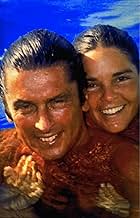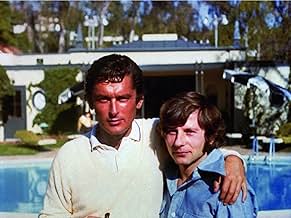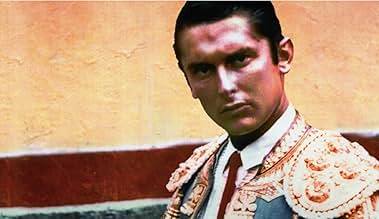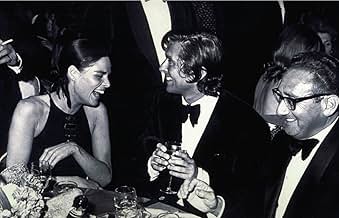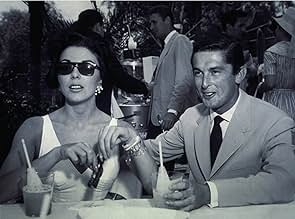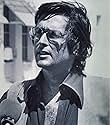IMDb RATING
7.3/10
8.3K
YOUR RATING
Documentary about legendary Paramount producer Robert Evans (the film shares the same name as Evans's famous 1994 autobiography).Documentary about legendary Paramount producer Robert Evans (the film shares the same name as Evans's famous 1994 autobiography).Documentary about legendary Paramount producer Robert Evans (the film shares the same name as Evans's famous 1994 autobiography).
- Directors
- Writers
- Stars
- Awards
- 4 wins & 13 nominations total
Eddie Albert
- Self
- (archive footage)
Peter Bart
- Self
- (archive footage)
Charlie Bluhdorn
- Self
- (archive footage)
William Castle
- Self
- (archive footage)
- (as Bill Castle)
Francis Ford Coppola
- Self
- (archive footage)
Catherine Deneuve
- Self
- (archive footage)
Charles Evans
- Self
- (archive footage)
Josh Evans
- Self
- (archive footage)
- (as Joshua Evans)
Mia Farrow
- Self
- (archive footage)
Errol Flynn
- Self
- (archive footage)
Ava Gardner
- Self
- (archive footage)
Karen Greenberger
- Self
- (archive footage)
Ernest Hemingway
- Self
- (archive footage)
Arthur Hiller
- Self
- (archive footage)
Henry Kissinger
- Self
- (archive footage)
Ali MacGraw
- Self
- (archive footage)
Steve McQueen
- Self
- (archive footage)
- Directors
- Writers
- All cast & crew
- Production, box office & more at IMDbPro
7.38.2K
1
2
3
4
5
6
7
8
9
10
Featured reviews
Life has it's ups and downs
I was half way through with the new Hollywood issue of Vanity Fair when I came across the excerpt from Robert Evans new memoir "Kid Nortorius." I had not heard of Robert Evans, but was fascinated enough to get a copy of "The Kid Stays in the Picture" to learn more.
I was glued to the tube watching the story of a man who had the incredible luck to get noticed. You all know the story of how some actress was discovered selling malteds in some drugstore. Evan was put into The Sun Also Rises. Both cast and crew, Ernest Hemingway, Tyrone Power, and Ava Gardner included, attempted to have Robert Evans fired during production. Producer Darryl F. Zanuck refused, saying, "The kid stays in the picture," thus leading to both Evans' long career as a producer and the title of his book, and this film.
He knew he had no future as an actor, but he also knew that the power was in producing. he managed to get named a Vice President of Paramount in another stroke of luck. Then his talent took over and he is the man behind such memorable films as Rosemary's Baby, Love Story, The Godfather, Marathon Man, and his first as an independent producer, Chinatown. It is the story behind these films that is fascinating, especially the fact that he and Paramount were in on Love Story and The Godfather from the beginning - before they were even written! His story with directors Roman Polanski and Francis Coppola are equally fascinating.
His own Love story with Ali McGraw is equally fascinating, though it ended in tragedy. But luck does a strange turn and tragedy really struck in the form of a Hollywood murder case where his name was mentioned. Not a suspect, just on the periphery, but it was enough to send him to the depths of hell - within a hair's breadth of suicide.
It was his friends that brought him back to where he is today. Now, he is telling the rest of the story in a new Memoir, "Kid Nortorious".
If you love films as I do, then you really need to see this one to provide a back story to some of your favorites. hey, you probably should be buying his books as well.
I was glued to the tube watching the story of a man who had the incredible luck to get noticed. You all know the story of how some actress was discovered selling malteds in some drugstore. Evan was put into The Sun Also Rises. Both cast and crew, Ernest Hemingway, Tyrone Power, and Ava Gardner included, attempted to have Robert Evans fired during production. Producer Darryl F. Zanuck refused, saying, "The kid stays in the picture," thus leading to both Evans' long career as a producer and the title of his book, and this film.
He knew he had no future as an actor, but he also knew that the power was in producing. he managed to get named a Vice President of Paramount in another stroke of luck. Then his talent took over and he is the man behind such memorable films as Rosemary's Baby, Love Story, The Godfather, Marathon Man, and his first as an independent producer, Chinatown. It is the story behind these films that is fascinating, especially the fact that he and Paramount were in on Love Story and The Godfather from the beginning - before they were even written! His story with directors Roman Polanski and Francis Coppola are equally fascinating.
His own Love story with Ali McGraw is equally fascinating, though it ended in tragedy. But luck does a strange turn and tragedy really struck in the form of a Hollywood murder case where his name was mentioned. Not a suspect, just on the periphery, but it was enough to send him to the depths of hell - within a hair's breadth of suicide.
It was his friends that brought him back to where he is today. Now, he is telling the rest of the story in a new Memoir, "Kid Nortorious".
If you love films as I do, then you really need to see this one to provide a back story to some of your favorites. hey, you probably should be buying his books as well.
a must-see for movie lovers
`The Kid Stays in the Picture,' a documentary about famed movie producer and studio head Robert Evans, begins like `The Great Gatsby,' a film Evans produced in 1974. To the wistful strains of `What'll I Do?' playing in the background, the camera glides lovingly over the furnishings, pictures and memorabilia that adorn Evans' Bel Air mansion and estate. The comparison is an apt one, for, like Gatsby, Evans was a wunderkind, a handsome young go-getter who knew early on the kind of life he wanted to lead and who willed himself to attain it. With a combination of good looks, charm, ambition and just a bit of plain old-fashioned good luck, he managed to go from being a mediocre movie actor to becoming the head of Paramount Studios in the course of a mere decade. And what a decade it was! Evans had a major hand in not only lifting Paramount from ninth to first place among Hollywood's major studios, but in bringing such films as `Rosemary's Baby,' `True Grit,' `Love Story,' `Chinatown' and, of course, `The Godfather' to movie screens everywhere.
`The Kid Stays in the Picture' is a dream-come-true for hardcore cinephiles, providing a fascinating behind-the-scenes glimpse into one of the true Golden Ages of Hollywood filmmaking. Evans' story is, in fact, the story of that time, for truly he hobnobbed with virtually every one of the key players responsible for that era. Evans' tale follows a fairly conventional arc for men of his type: the ambitious kid with dreams of larger-than-life glory achieves meteoric success in the entertainment business only to have his ambitions dashed on the shores of rampant egotism, overconfidence and drug addiction. In fact, Evans' life would make perfect fodder for a film of its own, as this documentary and the positive response to it demonstrates. Evans himself narrates the film, and although he tends to be a bit easier on himself than an outsider might have been, he is still willing to chastise himself when he feels it's called for and to render some rather startlingly unflattering assessments of certain major players on the Hollywood scene. He is, also, however, utterly devoted to those he feels have stuck by him through good times and bad, and he is not averse to lavishing praise on others when it is due. One objection to Evans' narration is that he doesn't always speak with the utmost clarity, sometimes making what he says come out garbled and incomprehensible.
As a piece of filmmaking, `The Kid Stays in the Picture' offers a kaleidoscopic array of stills, film clips and reenactments that reflect the temper and mood of the time. Directors Brett Morgan and Nanette Burstein obviously pored through a wealth of material on the subject, culling from it a comprehensive, streamlined and fast-moving narrative that grips the audience with its humor, its sadness and its tribute to the indomitableness of the human spirit. For if Evans' story is about anything, it is about how important it is for each individual to achieve his dreams and how equally vital it is for that same person, once he has fallen down, to pick himself up off the floor so that he can continue pursuing that dream.
`The Kid Stays in the Picture' is a wonderful time capsule for those who love movies. No true film fan should miss it.
`The Kid Stays in the Picture' is a dream-come-true for hardcore cinephiles, providing a fascinating behind-the-scenes glimpse into one of the true Golden Ages of Hollywood filmmaking. Evans' story is, in fact, the story of that time, for truly he hobnobbed with virtually every one of the key players responsible for that era. Evans' tale follows a fairly conventional arc for men of his type: the ambitious kid with dreams of larger-than-life glory achieves meteoric success in the entertainment business only to have his ambitions dashed on the shores of rampant egotism, overconfidence and drug addiction. In fact, Evans' life would make perfect fodder for a film of its own, as this documentary and the positive response to it demonstrates. Evans himself narrates the film, and although he tends to be a bit easier on himself than an outsider might have been, he is still willing to chastise himself when he feels it's called for and to render some rather startlingly unflattering assessments of certain major players on the Hollywood scene. He is, also, however, utterly devoted to those he feels have stuck by him through good times and bad, and he is not averse to lavishing praise on others when it is due. One objection to Evans' narration is that he doesn't always speak with the utmost clarity, sometimes making what he says come out garbled and incomprehensible.
As a piece of filmmaking, `The Kid Stays in the Picture' offers a kaleidoscopic array of stills, film clips and reenactments that reflect the temper and mood of the time. Directors Brett Morgan and Nanette Burstein obviously pored through a wealth of material on the subject, culling from it a comprehensive, streamlined and fast-moving narrative that grips the audience with its humor, its sadness and its tribute to the indomitableness of the human spirit. For if Evans' story is about anything, it is about how important it is for each individual to achieve his dreams and how equally vital it is for that same person, once he has fallen down, to pick himself up off the floor so that he can continue pursuing that dream.
`The Kid Stays in the Picture' is a wonderful time capsule for those who love movies. No true film fan should miss it.
Glossy and Superficial, But Still Quite Interesting
7 out of 10
It is hard to resist this documentary even though it seems more like self promotion. The fact that this man has attained what others could only dream about makes it a must see itself. Robert Evans certainly does seem to embody every stereotype one could imagine when they think of a Hollywood producer. He is rich and suave, he wears big, tinted glasses, dresses in gaudy suits, hosts wild parties, dates beautiful women, and lives in a beautiful, serene Hollywood home. You would think that he would almost have to be a caricature, but he isn't. His stories involving famous Hollywood celebs, both past and present, could alone fill a movie if not several.
Of course that is the problem with the documentary. It all seems a bit too Hollywood. Everything seems a bit phoney and too far removed from the average person. He seems, in a way, to have made a production out of himself. The film, like the man, is very deliberate and highly glossy. It depends almost exclusively on some very well transferred old photographs and elaborate stills. At no time do we ever get someone else's viewpoint or perspective. Evans shows no ability at having any self depreciating humor or humbleness. His determination and gutsiness is inspiring yet it would have been nice to see Evans as a child and a little bit more on his upbringing. Also the dialogue between him and his then wife Ali Macgraw seems really weird and only adds to the mythical quality of the thing.
Evans does all the narrating and proves to be quite a character and showman. His ability to do different accents and voices is impressive. The whole thing is very fluid and it gets you involved in a hypnotic sort of way. You also gotta love his saying, which was taken from an old Chinese proverb "Luck is when opportunity meets good preparation."
It is hard to resist this documentary even though it seems more like self promotion. The fact that this man has attained what others could only dream about makes it a must see itself. Robert Evans certainly does seem to embody every stereotype one could imagine when they think of a Hollywood producer. He is rich and suave, he wears big, tinted glasses, dresses in gaudy suits, hosts wild parties, dates beautiful women, and lives in a beautiful, serene Hollywood home. You would think that he would almost have to be a caricature, but he isn't. His stories involving famous Hollywood celebs, both past and present, could alone fill a movie if not several.
Of course that is the problem with the documentary. It all seems a bit too Hollywood. Everything seems a bit phoney and too far removed from the average person. He seems, in a way, to have made a production out of himself. The film, like the man, is very deliberate and highly glossy. It depends almost exclusively on some very well transferred old photographs and elaborate stills. At no time do we ever get someone else's viewpoint or perspective. Evans shows no ability at having any self depreciating humor or humbleness. His determination and gutsiness is inspiring yet it would have been nice to see Evans as a child and a little bit more on his upbringing. Also the dialogue between him and his then wife Ali Macgraw seems really weird and only adds to the mythical quality of the thing.
Evans does all the narrating and proves to be quite a character and showman. His ability to do different accents and voices is impressive. The whole thing is very fluid and it gets you involved in a hypnotic sort of way. You also gotta love his saying, which was taken from an old Chinese proverb "Luck is when opportunity meets good preparation."
like Evans himself, this documentary isn't as great as it thinks it is, but it is watchable throughout
Robert Evans's book version of this documentary, The Kid Stays in the Picture, is still un-read by me. But I have read much about him from other movie books from the 70's, and so this film does illuminate certain aspects of him that I already knew- his huge ego, his drug addiction, his proclivity to lots and lots of women, and having some part in the more outstanding films of the 1970's. Sometimes with Evans himself narrating throughout two things become apparent as peculiarities that keep it from being great- 1) the filmmaker's style is rather repetitive and, aside from some flourishes of talent, isn't anything too grand for the material, and 2) the three sides to the story that Evans is quoted with at the beginning become rather blurred as one full-on nostalgia (for bad and good) comes out. What makes it captivating, however, is that Evans is the kind of guy who will be honest about being full of crap and will even call on himself for his past troubles. Rarely has one man's achievements gone neck and neck with his flaws, and let out in a filmic, grandiose style such as this.
Evans is shown to have, basically, a lot of luck as someone getting into Hollywood (as many of these stories go). He starts out as a so-so actor and tries desperately to establish himself as a producer. He becomes more apart of the development side of the pictures, and ushers through Rosemary's Baby, Love Story, and even the Godfather to an extent. As his story includes the personal side (his rise and fall in the relationship to Ali McGraw, the cocaine, the other tabloid stuff), the other side of his professional accomplishments still gears in for room. By the end, one can see that the man has gone through enough to have his rightful reputation as Paramount's longest remaining producer, and will likely hold onto his ego of being the head-cheese kind of 'creative producer' so many directors like or dread till the grave. If anything, the film is actually too short, as at 93 minutes (a brilliant Dustin Hoffman imitation over the credits included) we only get glimpses that are further expounded in the book. Therefore its already subjective viewpoint becomes even more crunched into one all-too-simple story on such an interesting case study.
The Kid Stays in the Picture, despite not being as terrific as the filmmakers might think it is by their sleek camera angles and typical interludes of montage, is as close to being as honest as it could be. Honest, in the sense that Evans doesn't hide much in his story and how his own way of speaking about it, in its deep-sounding and straight-forward Hollywood way, is what film buffs look for. He may have been and done a lot of things, but as he says at the end, "I enjoy what I do, which most people can't say that they do."
Evans is shown to have, basically, a lot of luck as someone getting into Hollywood (as many of these stories go). He starts out as a so-so actor and tries desperately to establish himself as a producer. He becomes more apart of the development side of the pictures, and ushers through Rosemary's Baby, Love Story, and even the Godfather to an extent. As his story includes the personal side (his rise and fall in the relationship to Ali McGraw, the cocaine, the other tabloid stuff), the other side of his professional accomplishments still gears in for room. By the end, one can see that the man has gone through enough to have his rightful reputation as Paramount's longest remaining producer, and will likely hold onto his ego of being the head-cheese kind of 'creative producer' so many directors like or dread till the grave. If anything, the film is actually too short, as at 93 minutes (a brilliant Dustin Hoffman imitation over the credits included) we only get glimpses that are further expounded in the book. Therefore its already subjective viewpoint becomes even more crunched into one all-too-simple story on such an interesting case study.
The Kid Stays in the Picture, despite not being as terrific as the filmmakers might think it is by their sleek camera angles and typical interludes of montage, is as close to being as honest as it could be. Honest, in the sense that Evans doesn't hide much in his story and how his own way of speaking about it, in its deep-sounding and straight-forward Hollywood way, is what film buffs look for. He may have been and done a lot of things, but as he says at the end, "I enjoy what I do, which most people can't say that they do."
An excellent telling of a great Hollywood story
Documentaries are a dime a dozen, and I've seen my share. Being the type of person who would watch a documentary on anything, I was excited to catch this film about a man who has had one hell of a career in Hollywood. I knew I would find the subject matter interesting, but was completely surprised at how much I enjoyed the way the story was presented.
The Kid Stays In The Picture is the story of Robert Evans, told in Evans' words and narrated by Evans himself. His amazing career highs and lows are detailed in fantastic cinematic fashion, utilizing photographs and film clips from Evans' acting, then producing career while accompanied by Evans' enrapturing narration. The stories told by Evans were so effective and interesting that it could have been overlaying a blank screen and would have riveting. He is truthful, arrogant and most importantly, self-deprecating. He isn't afraid to admit the mistakes he made in his career, which is a refreshing turn from so many self-serving documentaries.
If anything, this film is worth watching for two scenes: When Evans tells the story of his near-suicidal moments that are harrowing in itself, but is accompanied by appropriate images from some of the films he produced. The other is during the final credits, when you see Dustin Hoffman do an incredible and hilarious impersonation of Evans on the phone. I certainly hope that Evans was proud of the way this documentary portrayed him, and should be commended in the way he portrayed himself.
--Shelly
The Kid Stays In The Picture is the story of Robert Evans, told in Evans' words and narrated by Evans himself. His amazing career highs and lows are detailed in fantastic cinematic fashion, utilizing photographs and film clips from Evans' acting, then producing career while accompanied by Evans' enrapturing narration. The stories told by Evans were so effective and interesting that it could have been overlaying a blank screen and would have riveting. He is truthful, arrogant and most importantly, self-deprecating. He isn't afraid to admit the mistakes he made in his career, which is a refreshing turn from so many self-serving documentaries.
If anything, this film is worth watching for two scenes: When Evans tells the story of his near-suicidal moments that are harrowing in itself, but is accompanied by appropriate images from some of the films he produced. The other is during the final credits, when you see Dustin Hoffman do an incredible and hilarious impersonation of Evans on the phone. I certainly hope that Evans was proud of the way this documentary portrayed him, and should be commended in the way he portrayed himself.
--Shelly
Did you know
- TriviaThe soundtrack narration, in which Robert Evans portrays all the other characters as well as himself, is taken directly from the recording of the audio-book version of his autobiography.
- GoofsThe closing credits say that Evans has been at Paramount for over 35 years, "more than any other producer on the lot." However, A.C. Lyles has been with Paramount for 75 years (as of 2003), though he is no longer actively producing.
- Quotes
Robert Evans: There are three sides to every story: Your side, my side, and the truth. And no one is lying. Memories shared serve each differently.
- Crazy creditsThe closing credits include 1976 footage of Dustin Hoffman doing an impersonation of a future Robert Evans of 1996.
- ConnectionsEdited from Kiss of Death (1947)
- SoundtracksSin Titulo
Performed by Chico O'Farrill
Written by Fernando Castro Valencia, Pepe del Rio, Ruben Berrios
Published by Peer International Corp.
Courtesy of the Verve Music Group
Under license from Universal Music Enterprises
- How long is The Kid Stays in the Picture?Powered by Alexa
Details
- Release date
- Country of origin
- Official site
- Language
- Also known as
- El chico que conquistó Hollywood
- Filming locations
- Production companies
- See more company credits at IMDbPro
Box office
- Gross US & Canada
- $1,439,232
- Opening weekend US & Canada
- $89,087
- Jul 28, 2002
- Gross worldwide
- $1,521,593
- Runtime
- 1h 33m(93 min)
- Color
- Sound mix
- Aspect ratio
- 1.85 : 1
Contribute to this page
Suggest an edit or add missing content


